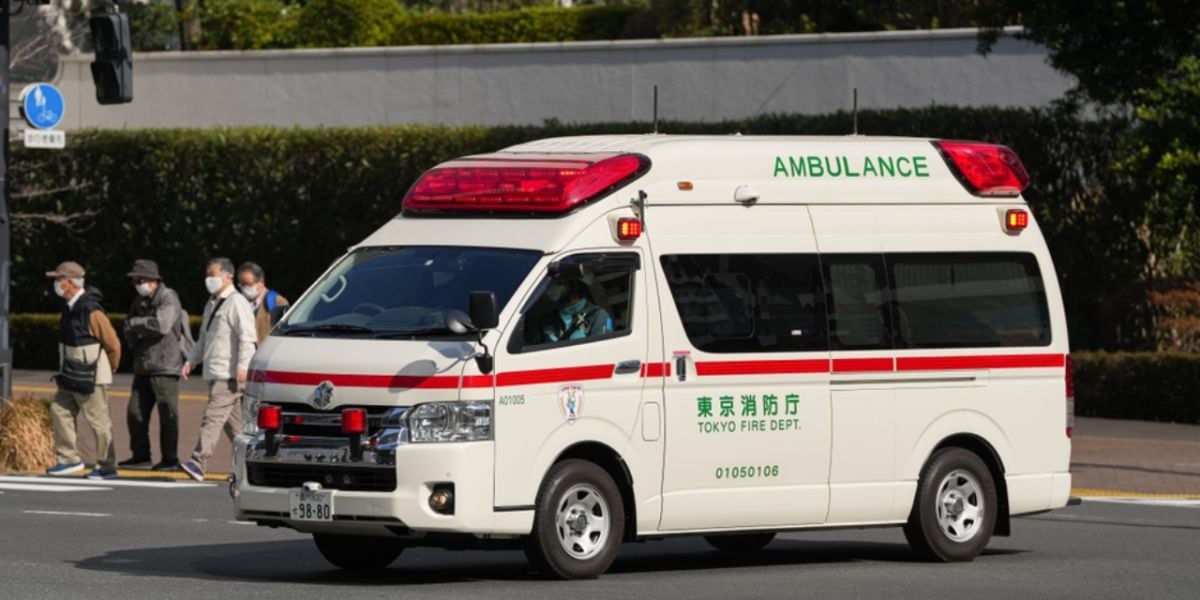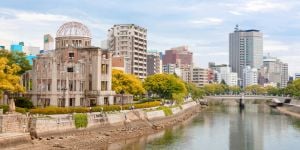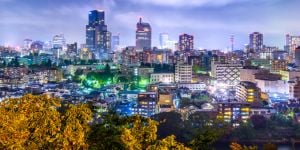
Although Japan is one of the safest countries to travel and live in, the country is located on the Ring of Fire, so there are many natural disasters, not to mention other accidents you might encounter in everyday life. If you plan to relocate to Japan, preparing yourself for any unexpected issues in your daily life is crucial. You'll find helpful information regarding accidents and emergencies in Japan in this article.
Is Japan safe?
Yes, Japan is safe. Compared to many other Western counterparts, Japan has commendable low violent crime rates, minimal violent demonstrations, restricted availability of weapons, and solid political stability. In the 2023 Global Peace Index, Japan secured 9th place among 163 countries as one of the most peaceful nations.
However, while Japan has low crime rates, it's better to stay cautious, be mindful of your surroundings, and seek advice on risky areas. Tokyo's entertainment districts, especially at night, for example, are known to be more dangerous. Foreigners have been victims of crimes like robbery, sexual assault, and extortion in clubs and bars.
In addition to crime, there are also diseases, accidents (including radiation from the Fukushima Daiichi nuclear accident), wild animals, the criminal justice system, and, of course, natural disasters. The chances that these things affect you are relatively low, but they may differ from what you're familiar with and could become more severe when combined.
The latest crime situation in Japan
According to the National Police Agency, the crime situation in Japan is more severe than ever. A total of 703,351 criminal law crimes were reported nationwide in 2023, marking an increase of 102,020 cases from the previous year. The number of criminal law crimes peaked in 2002 at 2,854,000, steadily declining for 19 years until a post-war low in 2021 at 568,000.
However, there has been an increase in criminal law crimes for the past two years. Street crimes, including bicycle theft and assault, accounted for 243,987 cases, increasing over 42,000 cases or 21% from the previous year.
Furthermore, there was a 30% rise in “major crimes” like murder and robbery, totaling 12,372 incidents. Special fraud accounted for 19,033 cases, resulting in approximately 44.12 billion yen in damages, the highest in the last 15 years. This amount surpassed the previous year by over 7 billion yen. Additionally, fraudulent remittances through Internet banking reached a record-breaking 8.6 billion yen in damages [source: Crime situation in Japan in 2023 (Japanese)].
Common natural disasters in Japan
Japan often experiences natural disasters due to its location along the Ring of Fire, where tectonic plates converge. Earthquakes, tsunamis, and volcanic eruptions are common occurrences.
In addition, tropical cyclones, or typhoons, forming over the Pacific Ocean and usually approaching the archipelago from July to October, often lead to heavy rain and floods. Heavy rain caused the most expensive damage to facilities in the past few years. Moreover, due to the rising number of typhoons in recent years, the damage caused by floods has also increased.
Source:
Natural disasters in Japan - stats and facts
Accidents in Japan
In 2023, Japan had 307,911 traffic accidents with 2,678 fatalities, slightly fewer than other Western countries like Germany (2,788), France (3,267), and Italy (3,159). In addition, adventure sports like skiing and snowboarding are among the common causes of accidents in Japan.
Source:
Road fatalities in the EU and EFTA countries
Is Japan safe for women and LGBTQ+?
In the 2023 Global Gender Gap report, Japan's ranking dropped to 125th out of 146 countries, marking its lowest position ever. The country's ongoing challenge to break through the glass ceiling was evident during the recent local elections, where numerous female candidates encountered sexual harassment.
Furthermore, during the first 6 months of 2023, there was an 11.2% increase in consultations regarding sexual crimes and violence compared to the same period in the previous year. The number of consultations each month also surpassed last year's figures.
On a positive note, there appears to be progress in raising social awareness about sexual minorities. The government has implemented a law to foster understanding of LGBTQ+ individuals, and local authorities are taking steps to eliminate gender-specific school uniforms.
Source:
Current situation of violence against women (Japanese)
Prepare for accidents and emergencies in Japan
Japan emergency contact numbers
Save these emergency contacts in your phone for quick access instead of wasting time searching for them online when needed.
- 119: for ambulances or fire services
- 110: for reporting accidents, theft, or other crimes (police)
- #8139 or 0570-00-8139: for the prompt removal of breakdown vehicles from the road (JAF Road Service)
- 0570-000-911: Japan Helpline (24-hour non-profit, nationwide emergency assistance service)
- 118: for any issues related to the Coast guard
In case of other non-emergencies, you can dial #9110 or 03-3501-0110 (Metropolitan Police Department General Counseling Center)
In case of being injured or feeling sick
If you need immediate assistance for a sudden illness, such as injuries from a car accident, burns, or poisoning, dial 119 and provide your location, name, and phone number calmly. Remember, you don't need coins to make an emergency call from a pay phone. It's a toll-free number.
Some helpful language in this case:
- Please send an ambulance.
きゅうきゅうしゃです。
Kyukyusha desu.
- My name is ----------.
わたしのなまえは----------です。
Watashi no namae wa ---------- desu.
- My address is ----------.
じゅうしょは------く(区)------ちょう(町)------ちょうめ(丁目)------ばん(番)------ごうです(号です)。
Jusho wa ------Ku, ------cho, ------chome, ------ban, ------go desu.
- My telephone number is ----------.
でんわばんごう(電話番号)は----------です。
Denwa bango wa ---------- desu.
Emergency clinics are available to provide medical assistance if you experience sudden illnesses on Sundays, holidays, New Year holidays, or during the night. Remember to bring your National Health Insurance Certificate when you visit a doctor. Make sure to check your city's website for specific contact information.
Japanese Health Insurance covers treatment, but emergency facilities may charge extra fees. It's advisable to bring extra money. Some hospitals require a cash deposit of 10,000-30,000 yen when no accounting staff is available. The deposit will be refunded during regular hours.
In case of traffic accidents
If you encounter a traffic accident, you should aid the injured first. In case you need an ambulance:
- Dial 119 immediately;
- Contact the Police at 110 and calmly provide them with all the necessary information about the incident, including your location, number of injured individuals, and extent of damage. Follow the instructions supplied by the police officer;
- Don't run away from the accident scene since it's illegal. Leaving the accident scene could result in a hit-and-run offense.
Move your vehicle to a safe spot away from traffic and switch off the engine to prevent further accidents. If you cannot call for help, ask someone nearby to do so. Consider getting insurance coverage for car accidents to ease the financial burden in case of an unfortunate event.
Source:
In case of fire
First, it is essential to familiarize yourself with the evacuation procedures when you move into a new place. Take note of the emergency stairs and ladders; if there is a balcony, ensure you can easily access your neighbor's balcony if needed. Avoid placing any objects that could obstruct your escape in an emergency. Additionally, guarantee that the stairs and corridors in your apartment or flat are clear of any obstacles. Regularly maintain the exit routes to ensure their functionality.
If the fire is minor, extinguish it on your own. This is known as "initial extinguishing". Fire extinguishers can be found in corridors and building entrances of apartments, condos, and businesses. They are simple to operate.
If you believe the fire is severe and beyond your control, call 119 right away and calmly give details like your location, the circumstances, your name, and phone number.
When a fire approaches the ceiling, evacuate immediately and don't even care about your appearance or belongings. To protect yourself from smoke inhalation:
- Cover your nose and mouth with a wet towel and drop to the floor;
- Crawl on your knees to avoid breathing in the smoke and make your way outdoors;
- Remember to close the doors and windows of the room with the fire to prevent it from spreading and shutting off the air supply.
To assist those who may not be fluent in Japanese and ensure effective communication, the Fire Department has partnered with a private interpretation agency to facilitate interpretation over the phone in English, Chinese, Korean, Portuguese, and Spanish.
Some helpful language in this case:
- There is a fire.
かじです。
Kaji desu.
- My name is ----------.
わたしのなまえは----------です。
Watashi no namae wa ---------- desu.
- My address is ----------.
じゅうしょは------く(区)------ちょう(町)------ちょうめ(丁目)------ばん(番)------ごうです(号です)。
Jusho wa ------Ku, ------cho, ------chome, ------ban, ------go desu.
- My telephone number is ----------.
でんわばんごう(電話番号)は----------です。
Denwa bango wa ---------- desu.
In case of falling victim to a crime
If you ever become a victim of a crime like a robbery or theft, don't hesitate to contact the Police by dialing 110. Stay calm and provide them with all the necessary details, such as the location of the incident, your name, and phone number.
Additionally, it's crucial to familiarize yourself with the whereabouts of your local Police station or Police box. Stay safe and be prepared!
Also, it is uncommon but possible for rape and sexual assault to occur in Japan. Japanese law requires victims to provide proof to show that sexual encounters were not consensual and involved assault, intimidation, or force.
In addition, female commuters have reported incidents of unwanted touching on trains. If you are involved in sexual harassment on a train, Police recommend you shout out at the perpetrator to draw attention and ask for help from a fellow passenger or train staff.
In case of missiles flying to Japan
North Korea often launches missiles toward Japan and is expected to continue doing so. In case of a potential missile strike, the J-ALERT system will send emergency information through sirens and emails. Follow official instructions immediately upon receiving a message. Missiles could reach Japan in less than 10 minutes after being launched.
If you are outside, seek shelter in a nearby building or underground. If no shelter is available, lie flat on the ground or take cover behind any protective barrier.
If you are inside, stay away from windows or remain in a windowless room.
Source:
In case of natural disasters
The Japan Meteorological Agency issues early warnings to inform people about an upcoming earthquake before intense shaking happens. When an earthquake has a magnitude of 5 or higher, it alerts areas with an intensity of 4 or higher a few seconds before the shaking starts. Stay alert for messages like "strong shaking is imminent" on TV screens. Be prepared to react swiftly to safeguard yourself when an earthquake strikes.
There are specific instructions to follow when you hear these warnings, depending on if you are indoors or outdoors. Check the disaster prevention handbook for foreigners on your prefecture or city's website for more information. For example:
- Government Disaster Prevention Guide Book (Tokyo Metropolitan);
- Prepare for disaster (Osaka);
- Disaster Prevention Handbook for Foreigners (Okinawa);
- Disaster Prevention Handbook (Ibaraki).
To ensure your safety, register your information so your loved ones can access it from their mobile phones or computers. Visit your communication device provider's website and check the mobile telephone disaster message boards for more information.
Some providers, like NTT Docomo, au, Softbank Mobile, and Y! Mobile, offer access to the message boards through their applications. Rakuten Mobile subscribers can use NTT West's "Disaster Message Board (web171)" for this purpose.
Useful apps and websites
- Japan Meteorological Agency website: for accurate earthquake, tsunami, and weather updates in English and Japanese. JMA also delivers the latest earthquake updates in 14 languages, including English, Chinese (simplified and traditional), Korean, Spanish, Portuguese, Vietnamese, Thai, Indonesian, Tagalog, Nepalese, Khmer, Burmese, and Mongolian;
- Disaster Management, Cabinet Office website: for various official information related to disaster prevention and management (Japanese and English);
- NHK World website: for news in English;
- Japan Healthcare Info website: for any information related to health, including emergencies, pregnancy, etc.;
- Safety Tips app both for iOS and Android);
- NAVITIME for Japan apps (both for iOS and Android).
Useful links:
Crime situation in Japan in 2023 (Japanese)
Natural disasters in Japan - stats and facts
Road fatalities in the EU and EFTA countries
Current Situation of Violence against Women (Japanese)
We do our best to provide accurate and up to date information. However, if you have noticed any inaccuracies in this article, please let us know in the comments section below.











